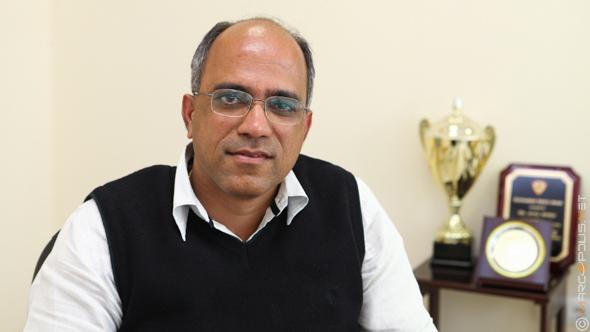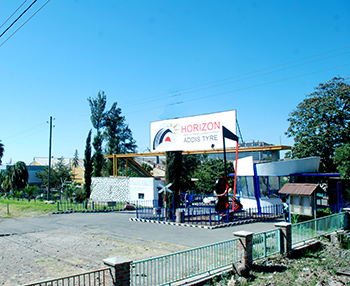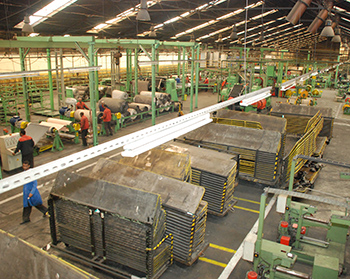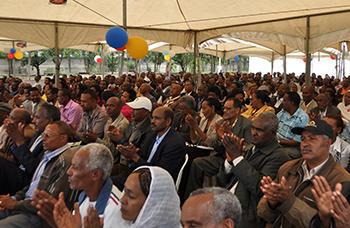Horizon Addis Tyre Company aspires to become one of the leading tyre producers in Africa
Umesh Davera, General Manager of Horizon Addis Tyre Company (Midroc Group Ethiopia)
Ethiopia is a land-locked country and so it has to rely primarily on the road transportion. The country has undoubtedly a great potential for growing its own rubber, especially in the Bebeka area where, according to the latest research, the climate seems to be ideal for rubber plantations. Nevertheless for the time being, about 75% of tyres is being imported from abroad.
Interview with Umesh Davera, General Manager of Horizon Addis Tyre Company (Midroc Group Ethiopia)

What is your overview of the tyre industry in Ethiopia? What is your outlook for 2014 and onward?
Before we focus on the tyre industry in this country, let’s go back to the mode of transportation. Ethiopia is a land-locked country and most of the transportation is by road. If you look at the potential, currently about 75% of the tyres have been imported into this country. As an industry, it gives us a lot of opportunities and challenges.
Can you give us a brief history of your company and the progress you have achieved over the years?
This factory was set up 40 years ago with the support of the government of Ethiopia. It moved on during the closed economy and later on as a part of the new technology revolution, it joined hands with Slovakian MATADOR to become MATADOR-Addis Tyre. Then MATADOR was sold globally to Continental. Continental subsequently decided to leave this country. After that the Horizon Plantations, which is part of Midroc Group, took over the shares of MATADOR and the company become Horizon Addis Tyre.
 If you look at the growth of this factory, it started making nylon tyres using Japanese technology and then with the advent of radial technology, MATADOR did bring PCR radial technology. Now as Horizon Addis Tyre, we are investing significantly in terms of upgrading existing technology and building of new skills of the people. We are focusing more on launching the new products that market needs by way of technical cooperation with the major partners globally. We want to make this local factory, which is the only tyre factory in Ethiopia, to have self-reliance in meeting the tyre needs of this country.
If you look at the growth of this factory, it started making nylon tyres using Japanese technology and then with the advent of radial technology, MATADOR did bring PCR radial technology. Now as Horizon Addis Tyre, we are investing significantly in terms of upgrading existing technology and building of new skills of the people. We are focusing more on launching the new products that market needs by way of technical cooperation with the major partners globally. We want to make this local factory, which is the only tyre factory in Ethiopia, to have self-reliance in meeting the tyre needs of this country.
Is Ethiopia a huge rubber producer?
It does have a great potential for rubber but it has not yet started producing it commercially. The information, that I do have, shows that in the Bebeka area of Ethiopia, the climate is most suitable for rubber plantations. In the past, a test was carried out and it showed that the quality of rubber in terms of the chemical properties was extremely good. So it does have a huge potential to be a rubber manufacturer including exporting to other countries but commercially it has not been explored yet. There is a lot of potential for growing rubber plantations.
Ethiopia has a huge potential for rubber but it has not yet started producing it commercially.
What type of tyres do you specialize in manufacturing?
In terms of the tyres or the type of tyre production, we broadly produce passenger-category tyres including both nylon and radial. We produce a light truck nylon as well as the radial and we are producing the truck nylon. As for the country, we are working towards self-reliance so that we can get rid of the importation. We are now investing in Light Truck Radial, Truck/Bus radial and in farm tyre expansion. Our aim is to produce more than 90% of the tyres that the country needs so that we can be self-reliant.
What is your current production capacity?
Currently, our production capacity is about 500,000 to 600,000 pieces per annum for existing range of production (excluding new expansion which is under completion).
Are you profitable as a division or do you still rely on the parent company in terms of finances?
 We were not profitable company when we took over from Matador. However, with the efforts put in by all of us, the business has become very profitable in the last 2 years.
We were not profitable company when we took over from Matador. However, with the efforts put in by all of us, the business has become very profitable in the last 2 years.
Can you compete with the factories in China in terms of pricing and quality?
In terms of quality, our products can meet all the major international standards and we can compete and we have been competing in the local Ethiopian market. Currently we are holding a 25% market share. We face competition from across the world particularly from China, India, Japan and Europe, and we have been competitive in terms of the quality of the product. When we talk about price, we need to work hard because productivity is a major constraint. When I say productivity, this is because we are not running at full capacity and we don’t have the right product mix. It is only a matter of time until we increase our capacity with new expansion up to near 100%. I’m sure we will be able to come closer on the export target price. Currently, yes it is a tough battle that we are fighting.
Are there any plans in terms of investments in factories to achieve exports in the near future?
We have already invested in the Light Truck radial expansion and the nylon tyre expansion project. This is the expansion we did for this year. In the next year, we are going to invent on the farm tyre/ Off-road tyre and Industrial tyre expansion. After these expansions that we have proposed for the next year, we will go for Truck/Bus radial tyre expansion which will be over within two years’ time. So, the expansion is only way forward to compete with imported products. We need to produce the right tyres as per market needs.
Do you have any joint ventures with car producers as far as using some of your tyre products?
 When MATADOR left the joint venture with the government and Horizon company took over, we did have a technical assistance partnership agreement with Continental Germany who has been helping us with the light truck expansion and new sizes for the passenger radials. As far as the nylon tyres are concerned, we have tie-up with foreign experts who have been helping us build the new sizes that we have never produced in this country.
When MATADOR left the joint venture with the government and Horizon company took over, we did have a technical assistance partnership agreement with Continental Germany who has been helping us with the light truck expansion and new sizes for the passenger radials. As far as the nylon tyres are concerned, we have tie-up with foreign experts who have been helping us build the new sizes that we have never produced in this country.
What is your vision? Where do you want to see Addis Tyre in the next five years?
Our aim is to make Horizon Addis Tyre one of the best companies in Ethiopia as well as one of Mthe leading tyre producers in the African continent.
What are some of the challenges that are facing your industry currently?
There are a few different challenges. One is the raw material which we 100% import. Once we commercialize a rubber plantation, then naturally we will get rid of this dependency on importation of rubber. Second, which is a big challenge for all of us here, is the skills of the human capital in the organization. This is a big challenge and we are investing heavily in this, in terms of hiring the expats, so that they can share their international experience with the locals and build their skills and capabilities. At the end of the day, even if you invest in the new technology and you bring the machinery, the key issue is the people with necessary skills who will make every factory good or bad. That is a key challenge for all of us.
FAIR USE POLICY
This material (including media content) may not be published, broadcasted, rewritten, or redistributed. However, linking directly to the page (including the source, i.e. Marcopolis.net) is permitted and encouraged.